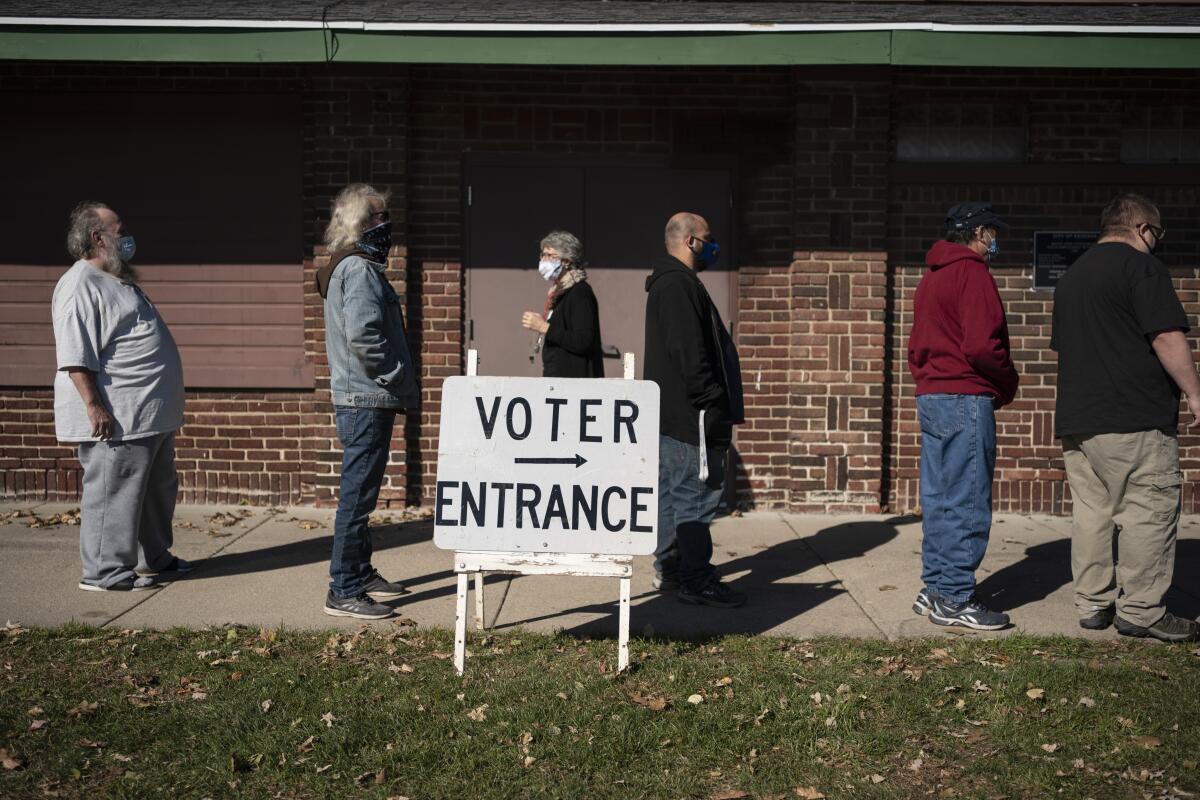Wisconsin voters to decide on GOP-backed election funding measure

- Share via
MADISON, Wis. — Wisconsin voters are set to decide next month whether to make it unconstitutional to accept private grant money to help administer state elections, one of two Republican-backed ballot measures that Democrats say are meant to make it harder to conduct elections in the presidential battleground state.
The constitutional amendments on the state’s April 2 ballot also include a change to allow only election officials designated by law to administer elections. If a majority of voters approve, the amendments would be added to the state’s constitution.
Early in-person absentee voting is scheduled to begin Tuesday and can be offered through March 31.
Since 2020, Republicans in at least 27 states have outlawed or restricted private elections grants.
The Wisconsin measures are supported by Republicans and conservative groups and opposed by an array of government watchdog and liberal groups including the American Civil Liberties Union, Common Cause Wisconsin, Wisconsin Conservation Voters and the League of Women Voters of Wisconsin.
Not a single Democratic lawmaker voted for the amendment, which is being split into two questions for the April ballot.
The Wisconsin measures stem from false claims made by former President Trump and his supporters that widespread voter fraud tipped the 2020 presidential election in favor of Joe Biden.
“People need to trust that elections are conducted fairly and impartially,” state Sen. Eric Wimberger, who co-wrote the amendments, said in a message posted on X. “Wisconsin’s status as a swing state makes election integrity measures important locally, nationally and internationally.”
Opponents say the measures are designed to make it more difficult to run elections.
The amendments specifically address a Republican complaint about grant money that came to Wisconsin in 2020 from the Center for Tech and Civic Life, a liberal group that fights for voter access and is funded by Facebook creator Mark Zuckerberg and his wife, Priscilla Chan.
The state’s five largest cities, all of which Biden won in 2020, received $8.8 million. They were among roughly 200 communities in Wisconsin that received around $10 million as part of $350 million given out nationally to help with the cost of running elections during the COVID-19 pandemic before vaccines were available.
Republicans who dubbed the money “Zuckerbucks” complained that the bulk of the funds went to Democratic strongholds and claimed it was an attempt by the billionaire to tip the vote in favor of Democrats.
“In the interest of upholding fairness and safeguarding the integrity of our democratic process, it is essential to maintain a nonpartisan electoral system that is free from external financial influences,” Kyle Koenen, policy director for the conservative law firm Wisconsin Institute for Law and Liberty, testified in support of the measure.
Zuckerberg and Chan have repeatedly said the one-time donation was meant to bolster the election infrastructure at the height of the pandemic to help people vote.
Republicans, who control the Wisconsin Legislature, advanced the constitutional amendment measure to circumvent Democratic Gov. Tony Evers, who almost surely would have vetoed it if the measure had been a regular bill. Amendments are not subject to the governor’s approval.
Three courts and the bipartisan Wisconsin Elections Commission rejected complaints challenging the legality of the grant money.
The other question on the ballot pertaining to who can be a poll worker was broken off from the private-money question.
Wisconsin law already explains the requirements to be a poll worker: the people who work as election inspectors and tabulators, greet voters and serve in other roles. For example, any poll worker must be approved by the municipality from a list of nominees submitted by the two major parties, be a qualified voter in the county where the election is taking place, and not be a candidate or related to a candidate on the ballot.
It’s unclear how adoption of the amendment would change current practice, other than place requirements currently in state law into the constitution. That would make the requirements more difficult to change.
Opponents of the amendment worry its adoption may lead to attempts to stifle current practices enhancing voter participation.
Wisconsin voters have approved 148 out of 200 proposed constitutional amendments since the state constitution was adopted in 1848, according to the nonpartisan Legislative Reference Bureau. Since Evers took office, voters have ratified three.
But after the two on the April ballot, more are on the way.
In the August primary, voters will be asked to change the law to give the Legislature a say in how federal money is spent, rather than having the governor decide.
An amendment on the November ballot says only U.S. citizens who are 18 years old or older can vote in elections. The Wisconsin Constitution guarantees every U.S. citizen age 18 and over is a qualified elector. But it does not specifically say only U.S. citizens are qualified to vote in state or local elections.
Federal law already requires U.S. citizenship to vote in national elections and no state constitutions explicitly allow noncitizens to vote in state or local elections.
However, there has been a push for states to specifically make clear that only U.S. citizens can vote in state and local elections. Some cities and towns across the country have allowed noncitizens to vote in local elections.
Bauer writes for the Associated Press.
More to Read
Get the L.A. Times Politics newsletter
Deeply reported insights into legislation, politics and policy from Sacramento, Washington and beyond. In your inbox twice per week.
You may occasionally receive promotional content from the Los Angeles Times.









